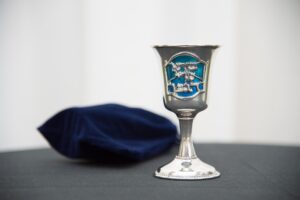American couples tying the knot in Italy
Picture this: the waves of the warm Mediterranean waters crashing ashore, as the groom steps on the ceremonial glass underneath a floral chuppah, and the guests break into a joyous shout of “Mazel Tov!”. These images of a Jewish destination wedding in Italy, are increasingly embraced and promoted by wedding planners.
For American couples planning a destination wedding, figuring out details such as location, florists, and chefs isn’t always easy. Businesses like Primavera Dreams, a wedding planning service located in Boston, specialize in helping couples to organize a wedding thousands of miles from home.
Luba Gankin, the founder of Primavera Dreams, has been planning dream weddings for the past six years. Traveling between Boston and Italy, Luba handles everything when it comes to planning weddings. During her six years of business, Luba has met couples from all over the U.S. who want to get married in Italy.
American Jewish couples who decide to get married in Italy are typically not Orthodox. Luba has seen that couples are not “deeply religious or are not strictly religious”. Even though many couples are not religious, most do want traditional Jewish elements in their wedding ceremony.
Customs, such as the sheva brachot, the signing of the ketubah, the breaking of the glass and the bedekin ceremony serve to signal and publicly display the couple’s Jewish religion.
After signing the wedding contract, or ketubah, weddings continue with the ceremony, including the sheva brachot (seven wedding blessings), which culminates with the breaking of the glass. Before the start of the reception, the bride and groom enact a private ceremony: yichud. During this ceremony, the bride and groom spend eight minutes in a private room for their first moments alone together as a married couple. For couples just wanting a Jewish-style wedding, a rabbi and a chuppah are often the sole Jewish symbols present.
All of these elements are identical to Jewish weddings as they are typically celebrated in the US, which raises the questions: Why go all the way to Italy for a wedding you could celebrate just as well at home? What accounts for the desire of Jewish Americans to get married in Italy? Why would Jewish Americans want to travel thousands of miles to just get married?
Luba has found that around half of her couples have a prior connection to Italy, for instance Italian heritage or having studied abroad there. The biggest draw for getting married in Italy is aesthetic. Luba finds that many couples want weddings in Italy simply because of the country’s beauty. In her six years planning weddings, Luba has planned weddings in Tuscany, the Amalfi Coast, Lake Como, and Puglia.
Couples tend to choose Italy as a pretty backdrop, a chance to travel to an exotic locale, and an opportunity to offer a unique experience to guests, but they seem to ignore the opportunity to explore the richness of the Jewish communities of Italy.
In fact, when planning a Jewish wedding in Italy, many American couples eschew any contact with Italian Jewry. The Jewish population in Italy is relatively small, and almost all synagogues follow Orthodox traditions, which makes marrying within a traditional Jewish space in Italy challenging for many Americans.
If couples want to marry in a traditional synagogue in Italy, they must abide by Orthodox law. Weddings must be performed by an Orthodox rabbi and the food must be kosher. To get married in any of the many beautiful and historic Italian synagogues entails restrictions that many couples find too confining (as well as costly), which is why Luba has never had a couple marry in one. “For some people it is important,” stated Luba “while for others, getting married in Italy is not about getting married in a synagogue, it’s about getting married in Italy”.
* This piece is part of a series of articles written by students of Muhlenberg College, Pennsylvania, USA, enrolled in a course on the history and culture of Jewish Italy, taught by Dr. Daniel Leisawitz, Assistant Professor of Italian and Director of the Muhlenberg College Italian Studies Program.

